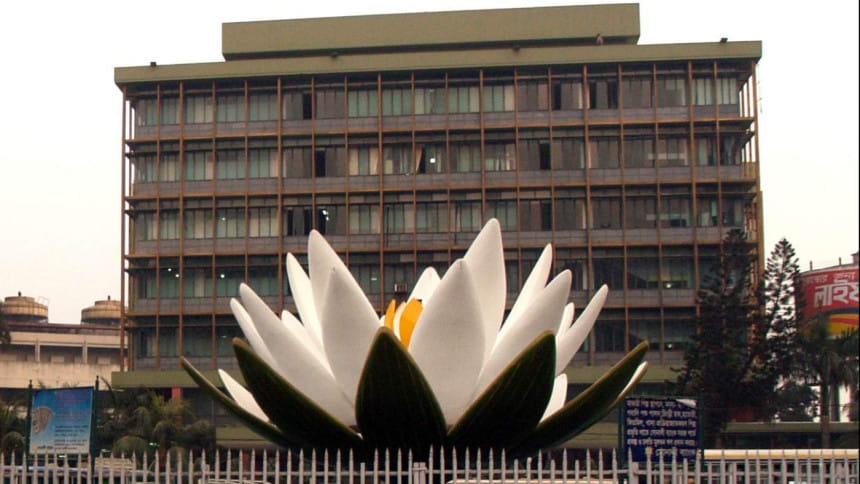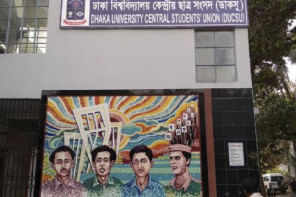Red blinking

Four business groups, which got their loans of Tk 3,200 crore restructured under the central bank's special policy around three years ago, have failed to pay regular instalments for most of the loans.
The companies -- SA Group, Ratanpur Group, Keya Group and MR Group -- now owe the money to a dozen state-run and private banks. The amount is 4 percent of the total defaulted loans of Tk 80,307 crore in the banking sector.
These large borrowers have recently applied to Bangladesh Bank for rescheduling the loans again, and are also lobbying with their lenders.
Contacted, SK Sur Chowdhury, deputy governor of the BB, said they are yet to decide on fresh rescheduling of the big loans.
In January 2015, the central bank offered a special package for borrowers who had bank loans of at least Tk 500 crore each. It relaxed the loan rescheduling policy for the borrowers who were required to make a down payment of just 1-2 percent, instead of usual 10-15 percent.
The BB made the move after several companies, including Beximco, Jamuna, Thermax and Sikder groups, asked for the facility, saying they had been affected by political unrest in the country between 2013 and 2015.
Eleven large borrowers availed themselves of the facility and had their loans of Tk 15,000 crore restructured.
Janata Bank alone restructured Tk 5,000 crore loans taken by seven business groups. Of those, three -- SA Group, Ratanpur Group and MR Group -- failed to pay regular instalments for their loans amounting to Tk 1,500.
“Some of these borrowers seem to be wilful defaulters. They are running their businesses, but they are not paying back their loans,” Abdus Salam Azad, managing director of the state-owned Janata Bank, told The Daily Star.
Md Shahabuddin Alam, owner of SA Group, is also a member of the board of directors of Mercantile Bank while Maksudur Rahman, managing director of Ratanpur Group, is a director of South Bangla Agriculture and Commerce Bank (SBAC).
Janata Bank last month served notices on the boards of both banks, and told them to ask their directors to settle the companies' dues with the state-run bank within two months.
As per the Banking Company Act, if the two fail to settle the loans within the stipulated time, their posts of director will automatically fall vacant.
SA Group had its loans of Tk 928 crore from six banks restructured in 2015, but it later became a defaulter with Rupali and Agrani banks.
It also failed to pay back its loans from First Security Islami Bank Ltd, according to BB data.
The company, however, managed to keep the status of its loan of Tk 256 crore from Bank Asia as unclassified by taking a stay order from the High Court.
Alam, owner of the Chittagong-based conglomerate, told this newspaper that the group could not generate enough income to be able to continue the payments.
This is because none of the lenders gave the group the working capital it was supposed to get after it took the restructuring facility, he claimed.
However, a senior official of Janata Bank told this correspondent that the SA Group didn't approach the bank for working capital after having its loans restructured.
The official further said Ratanpur Group and MR Group were provided with working capital in the form of LC (Letter of Credit) after the two availed themselves of the loan restructuring facility.
But both the groups failed to pay the first instalments in December last year, around a year after getting the facility.
The official also noted that loan limits were not raised for some business groups as they didn't have adequate collateral.
Asked about the reason for failure to pay instalments, MD of Ratanpur Group Maksudur claimed, “We could not continue regular payments because of the big size of instalments.”
The size of the loan instalments should be reduced, he said.
The group in 2015 had its loans of Tk 535 crore restructured from two banks under the BB's special package.
Modern Steel Mills, a sister concern of Ratanpur Group, has recently approached the central bank to have its loans of Tk 121.39 crore from Trust Bank rescheduled just two years after the regulator allowed it to get the loans restructured.
Trust Bank approved the client's proposal for further rescheduling and sent it to the BB for approval.
Another company, Keya Group, got its loans of Tk 879 crore from five banks restructured under the BB package.
Its sister concern Keya Yarn, which got its Tk 34 crore loan from Agrani Bank restructured, failed to make the required down payment. The firm was stripped of the restructuring facility, and it later became a defaulter.
The Group also failed to continue the regular payments of its Tk 14 crore loan from Bank Asia, which had been restructured in 2015. It is now negotiating with the bank to settle the loan, said a senior executive of Bank Asia, seeking anonymity.
Also, MR Group had its loans of Tk 572 crore restructured with four banks, including Agrani and Janata.
The company couldn't pay regular instalments to the banks. It, however, managed to keep the status of the loans as unclassified by getting a stay order from the HC.
Khondkar Ibrahim Khaled, former deputy governor of the central bank, said the BB had provided the restructuring facility to large borrowers to reduce defaulted loans, but that did not work.
He cited lax monitoring by the BB as the main reason for the failure to ensure regular payments from the big borrowers.
If they are given the facility again, it will lead to indiscipline in the banking sector, he said.
The former BB deputy governor suggested that the banks concerned should take legal steps against the borrowers.
The average loan default rate in the banking sector was 9.69 percent in December 2014 before the BB offered the facility. The rate came down to 8.79 percent at the end of 2015 after the restructuring of loans.
But the downward trend didn't continue for long, and the rate went up to 9.23 percent in December last year. It kept rising throughout the year and stood at 10.67 percent in September this year, according to the latest data of the BB.

 For all latest news, follow The Daily Star's Google News channel.
For all latest news, follow The Daily Star's Google News channel. 



Comments